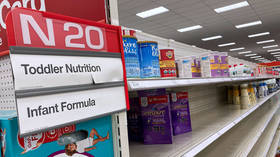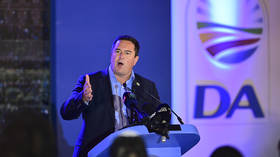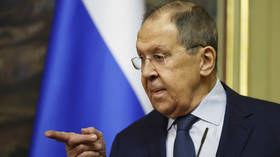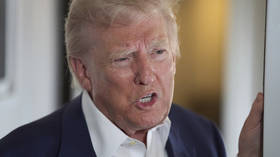US announces steps to combat shortage of baby formula

The US will temporarily allow imports of baby formula from foreign producers in an effort to ease the effects of the ongoing nationwide shortage, which has been putting pressure on American families.
The Food and Drug Administration (FDA) announced the decision on Monday, adding that the new products will have to be in line with US safety and nutrition regulations, which are provided by the FDA, but noted that the review process would be streamlined to make it easier for foreign manufacturers to begin shipping formula to the US.
“We are hopeful this call to the global market will be answered and that international businesses will rise to the occasion to assist in bolstering the supply of products,” FDA Commissioner Robert Califf said in a statement.
White House Press Secretary Karine Jean-Pierre confirmed the move in a press briefing on Monday, adding that the administration was also working on providing transportation and logistical support to major formula manufacturers and retailers.
“We are also in ongoing communications, as we talk about retailers here as well, with Target and Amazon and Walmart and other leading retailers for baby formula to identify parts of the country that may be at risk of critically low supply of infant formula, and have offered to work with manufacturers and retailers to bring more formula to those parts of the country, including the U.S. government transportation and logistical support,” Jean-Pierre said.
The US has been faced with a nationwide shortage of baby formula since February, after already existing supply chain issues stemming from the Covid-19 pandemic were exacerbated by a major product recall by one of the country’s main formula manufacturers, Abbott Laboratories.
The FDA had been investigating the manufacturer after it received reports of four infants allegedly falling ill from Abbott’s products. The investigation reportedly found evidence of bacterial contamination at the site of Abbott’s largest production facility in Sturgis, Michigan, and subsequently ordered the plant to suspend operations pending investigation.
On Monday, the US Department of Justice announced that it had reached a tentative agreement with Abbott to resolve safety issues at the plant, and that upon updating its safety protocols, the facility will be able to resume production in as soon as two weeks, as long as it receives approval from the FDA.
However, neither the import of foreign formulas nor the re-launch of Abbott’s Sturgis facility are expected to have an immediate effect on the limited supplies that continue to put pressure on American families. Even if the FDA gives the green light for Abbott to restart domestic production of formula in two weeks, it would still take an additional 8 to 10 weeks for the products to hit store shelves, Abbott Laboratories has said.
And while baby formulas produced in Canada and Europe are mostly equivalent to those in the US, companies looking to enter the US market still face a number of major hurdles, including extensive research and manufacturing standards inspections imposed by the FDA, which could mean that the integration process of these products into US supply chains will take up to several months, according to experts.













